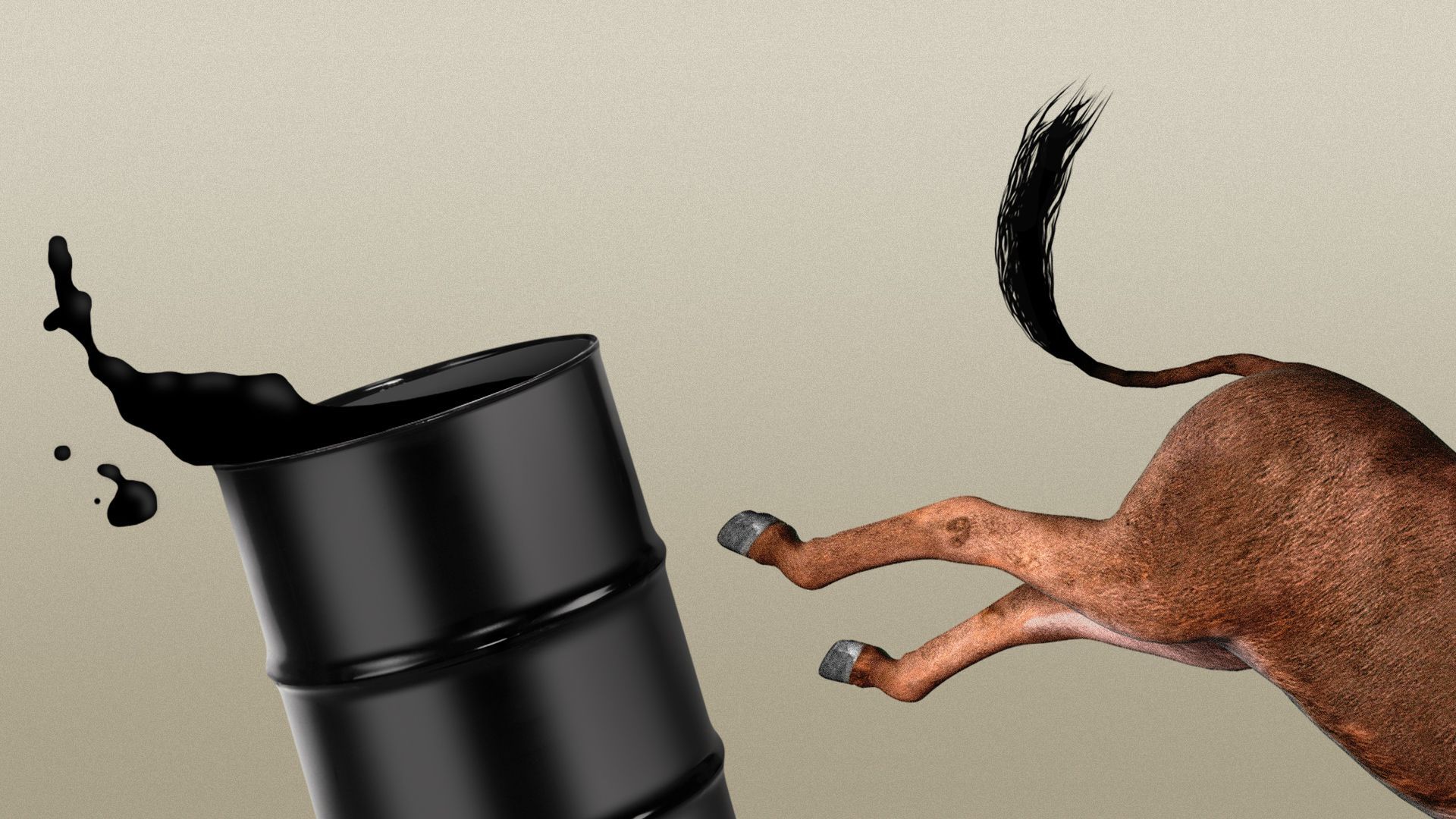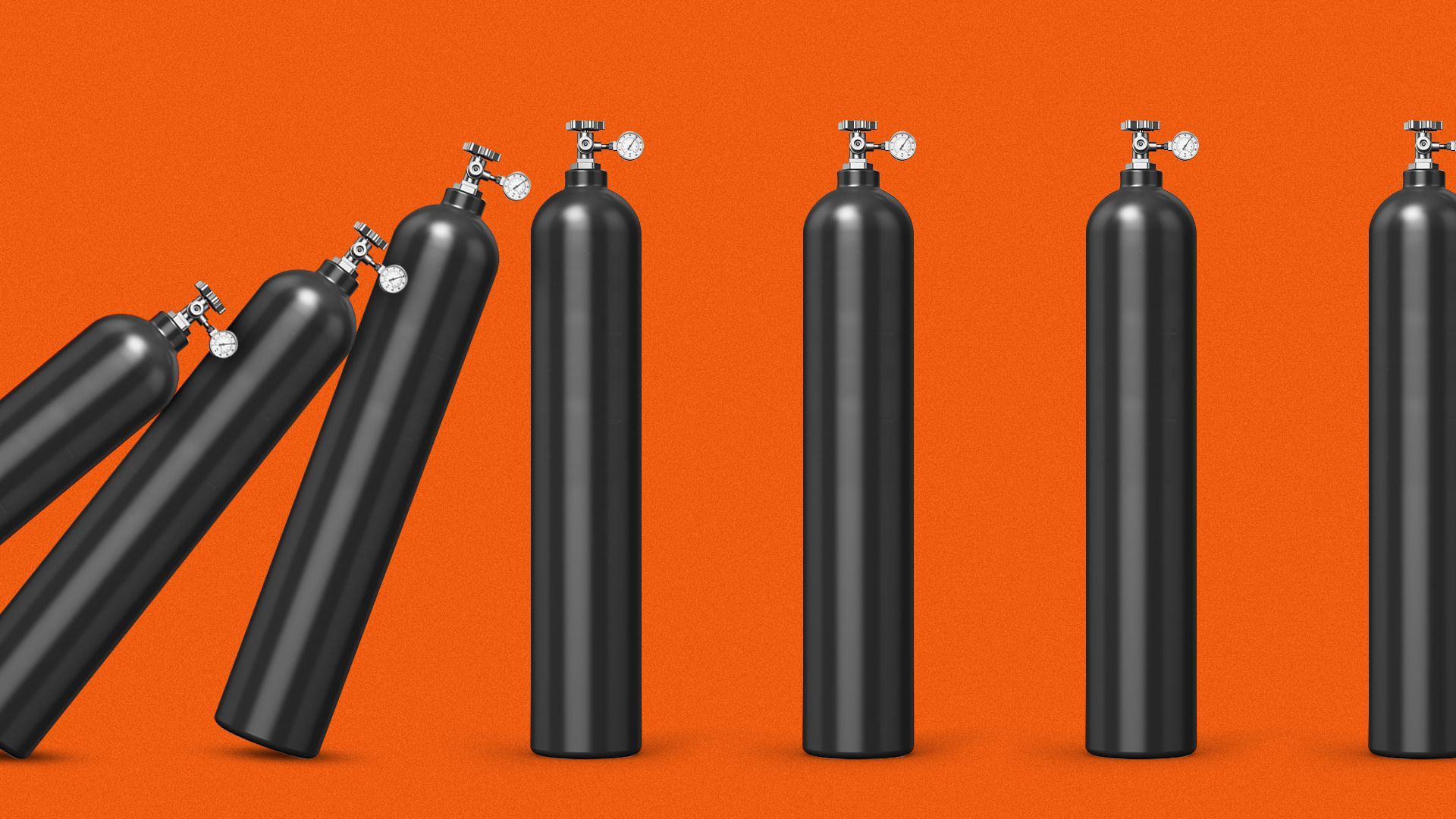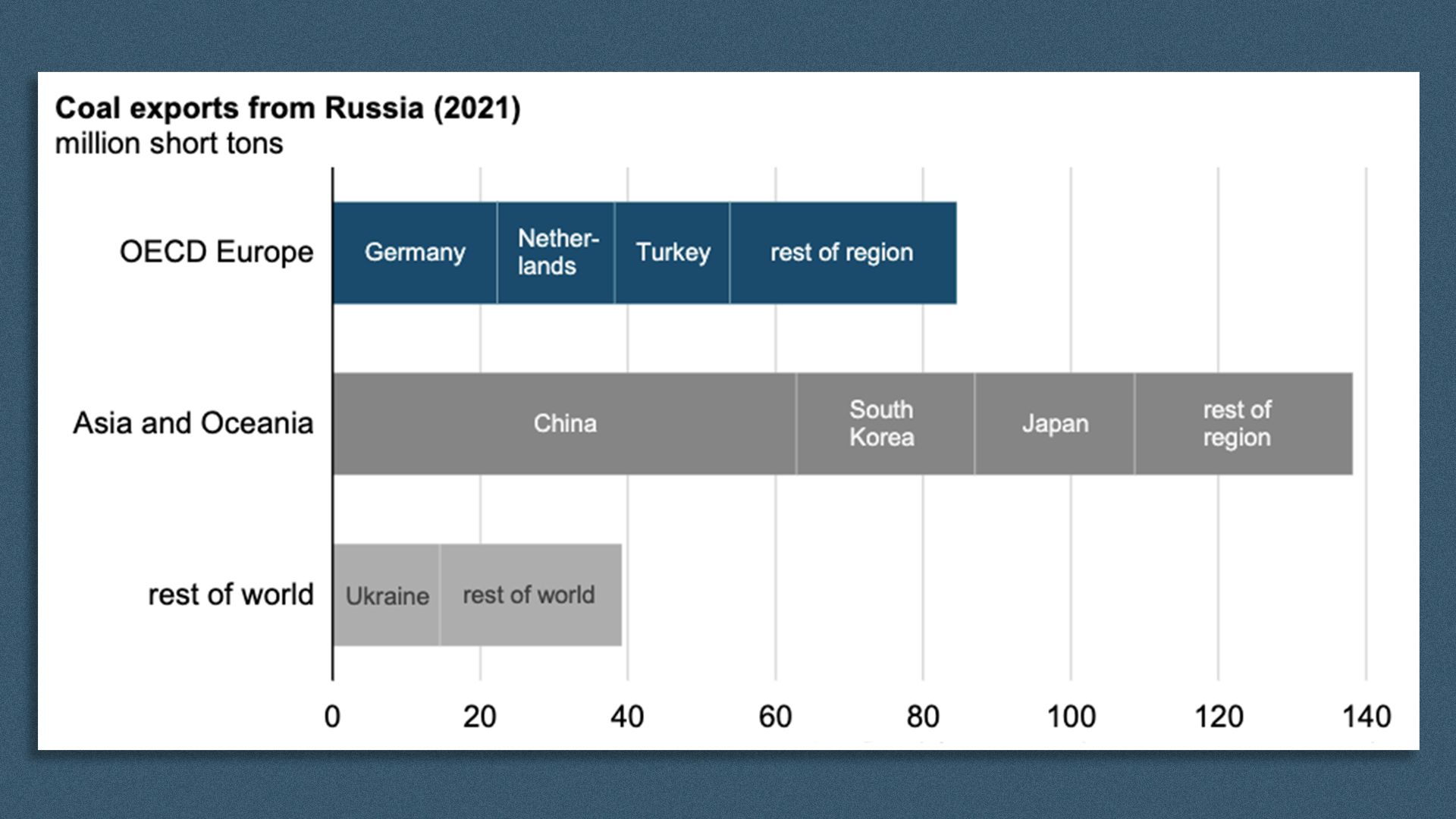| |
| |
| |
| Presented By Ericsson |
| |
| Axios Generate |
| By Ben Geman and Andrew Freedman ·Apr 06, 2022 |
| 🐪 It's Wednesday so let's walk like a camel. Today's Smart Brevity count is 1,248 words, 5 minutes. |
| |
| |
| 1 big thing: What to watch at Big Oil's Beltway showdown |
 |
|
| Illustration: Aïda Amer/Axios |
| |
| Oil execs will appear before a House Committee today at a hearing with a title that previews Democrats' political attacks: "Gouged at the Gas Station: Big Oil and America's Pain at the Pump," Ben writes. Why it matters: Gasoline prices have eased a bit but remain far north of $4-per-gallon on average. The high prices are creating political vulnerability for Democrats while prompting fresh criticism of oil companies. What's next: CEOs of Exxon and Chevron and top U.S. execs with Shell and BP will testify before the Energy and Commerce Committee. Heads of two huge independent producers — Devon Energy and Pioneer Natural Resources — will testify too. What they're saying: Committee chair Frank Pallone (D-N.J.) will accuse CEOs of "ripping off the American people," per an excerpt of his opening remarks. - He will allege they're refusing to boost production, and instead, plowing profits into stock buybacks.
- "After decades of insisting that Big Oil is the path to American energy independence, these same companies are refusing to help American consumers suffering from the fallout from Putin's war," he intends to say.
The other side: Prepared testimony from the companies makes a few points... - One is that large oil companies don't dictate prices — especially in a system where the vast majority of gas stations are independently owned.
- "[W]e do not control the market price of crude oil or natural gas, nor of refined products like gasoline and diesel fuel, and we have no tolerance for price gouging," Chevron CEO Mike Wirth's prepared testimony states.
- Various execs also point to their efforts to boost domestic production, which is growing again slowly. But they also point to supply chain and labor constraints, investor demands for returns, and call for more supportive federal permitting and leasing policies.
What we're watching: Whether the big new United Nations climate report will surface. It lays out the need for vastly speeding clean energy transition and refraining from new fossil fuel infrastructure. Go deeper: Big Oil to tell Congress markets, not companies, set fuel prices (Reuters) |
    |
| |
| |
| 2. Helium shortage hits National Weather Service |
 |
|
| Illustration: Aïda Amer/Axios |
| |
| As the spring tornado season kicks into high gear, the National Weather Service is facing shortages in the two gases it uses to fill weather balloons, Andrew writes. Why it matters: Weather balloons are launched twice daily at about 100 locations nationwide. They provide vital information for weather forecasting, from the temperature and moisture in the atmosphere to the winds aloft. With extreme weather events on the increase due in large part to human-caused climate change, America's forecasting infrastructure is showing signs of strain. Driving the news: Several balloon sites have had to limit launches in recent days due to helium supply chain issues, plus a contract dispute with a hydrogen gas supplier. - On March 29, the NWS sent a bulletin announcing the reduction in the frequency of balloon launches, but promising no impact to forecast accuracy.
- About 9% of the 101 upper air observation sites were affected by the gas shortage and contract problem.
- "This temporary adjustment will not impact weather forecasts and warnings," it stated.
- However, some meteorologists sharply disputed that assertion.
Details: According to NWS spokeswoman Susan Buchanan, as of yesterday, the hydrogen contract was resolved, but gas deliveries may take up to six weeks. Three helium balloon sites remain hobbled, however. What they're saying: Buchanan said the public statement "could have been better worded." - "Upper air soundings are a critical observation tool for weather forecasts. Because of the vital importance of this data, we have been doing everything we can to resolve supply issues," she said via email.
Read more. |
    |
| |
| |
| 3. Where Russia sends its coal |
 |
|
| Screenshot: U.S. Energy Information Administration |
| |
| The new European Union vow to ban Russian coal would block a major export market, Ben writes. Why it matters: EU officials say the plan announced yesterday, part of wider new sanctions, thwarts $4.4 billion worth of Russian revenues. Yes, but: European leaders have not yet directly targeted natural gas and oil exports that are far more lucrative for Russian President Vladimir Putin. But the bloc plans to wean itself from heavy reliance in the coming years. The big picture: Russia supplies around 45% of Europe's coal. Other key suppliers include the U.S. and Australia. - "In principle, shipments from countries that have reduced exports to the EU are still largely available to substitute for Russian coal," analysts at the European economic think tank Bruegel said, per Reuters.
- But Bloomberg reports the coal ban is nonetheless a "big gamble" because Europe is "potentially leaving itself vulnerable to shortages and rolling blackouts."
|
    |
| |
| |
| A message from Ericsson |
| How 5G and modern tech can help achieve global climate goals |
| |
 |
| |
| Ericsson introduces an innovative approach for securing network energy efficiency, including four key elements: - Prepare the network.
- Activate energy-saving software.
- Build 5G with precision.
- Operate site infrastructure intelligently.
|
| |
| |
| 4. Climate notes: power outages and natural gas |
| Extremes: "Power outages from severe weather have doubled over the past two decades across the U.S., as a warming climate stirs more destructive storms that cripple broad segments of the nation's aging electrical grid, according to an Associated Press analysis of government data." (Associated Press) Infrastructure: "Asia is pumping billions of dollars into new gas infrastructure, making the region pivotal in a debate over the role of the fossil fuel as the world aims to curb emissions," Bloomberg reports, citing estimates of $350 billion in LNG, power and pipeline projects underway. |
    |
| |
| |
| 5. Carbon accounting startup nabs $73M |
 |
|
| Illustration: Sarah Grillo/Axios |
| |
| Sweep, a Paris-based emissions accounting and management startup, raised $73 million in Series B funding led by the investment firm Coatue, Ben writes. Why it matters: Money is pouring into startups that help companies track and cut emissions at a time as corporate pledges and, increasingly, regulations drive the market. The intrigue: Sweep, in the announcement, says the planned Securities and Exchange Commission climate disclosure rules are bullish for their services. - It cites a recent report from the shareholder advocacy group As You Sow which argued most companies lack comprehensive emissions plans.
- "But this will likely change following SEC's proposed disclosure rules that'd require thorough annual emission and climate risk reporting," Sweep said.
Flashback: The company raised a $22 million Series A round late last year. The big picture: Sweep is among several software startups that, in various ways, help clients with sophisticated analytics needed to tally emissions — including through supply chains — and devise credible plans to cut them. |
    |
| |
| |
| 6. GM eyes the electric future at Axios summit |
 |
|
| GM CEO Mary Barra and Axios' Mike Allen at the Axios What's Next Summit. Photo: Chuck Kennedy/Axios |
| |
| General Motors and Honda are redoubling efforts to make electric vehicles more attainable by 2027, GM CEO Mary Barra said yesterday at the Axios What's Next Summit, Joann Muller and Noah Garfinkel write. Why it matters: EVs are starting to catch on, but their luxury-car prices put them out of reach for most buyers. Making EVs more affordable is the key to widespread adoption. Driving the news: The two automakers announced yesterday that they would expand their existing partnership to develop millions of sub-$30,000 EVs in the most popular vehicle categories, including compact crossover utilities. - The future EVs will be based on a new modular platform and use GM's next-generation Ultium battery technology.
What they're saying: "It's an important play to bring not only scale but speed to make EVs affordable for everyone," Barra told Axios co-founder Mike Allen. - "By 2025, we'll sell more EVs in the U.S. than anyone else. To do that you need a portfolio of vehicles," she said, from compact affordable EVs to super-trucks like the new GMC Hummer EV.
Share this story. |
    |
| |
| |
| Bonus: DeLorean teases EV concept |
 |
|
| Photo courtesy of DeLorean |
| |
| It's a DeLorean, as Marty McFly once said. Or a distant cousin. Anyway, DeLorean Motor Company this week released a teaser of the EV concept it's releasing in August, Ben writes. Why it matters: It's fun and the gull-wing doors of the long-defunct car are iconic. What we don't know: The chances it makes the big leap from concept to an actual production vehicle. TechCrunch has more. |
    |
| |
| |
| A message from Ericsson |
| Breaking the energy curve: How to reduce mobile network energy use |
| |
 |
| |
| The ICT sector must leverage ultra-lean design features of 5G to break the increasing energy consumption curve of mobile networks. Here's why: 5G is the most energy-aware standard with network energy performance fully integrated into its design. Get the details. |
| |
| Thanks for reading and have a great Wednesday. We'll see you back here tomorrow. |
 | It's called Smart Brevity®. Over 200 orgs use it — in a tool called Axios HQ — to drive productivity with clearer workplace communications. | | |










No comments:
Post a Comment